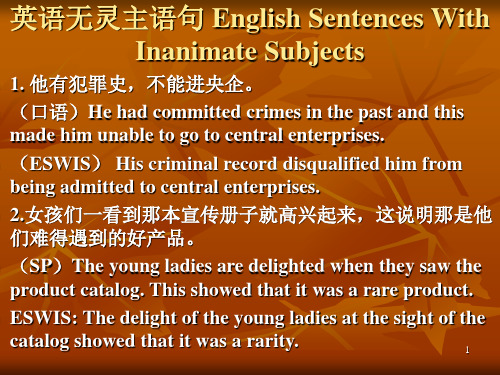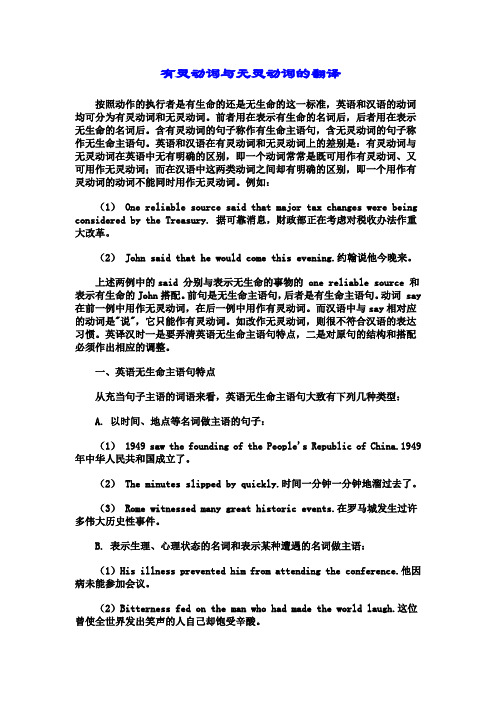无灵主语有灵主语句的翻译
优选无灵主语与翻译

Fortune smiled on him and he was soon promoted. 他际遇好,很快就提升了。
Anger choked his words. 他气得说不出话来。
把英语“无灵主语”译为汉语的状语
其实,把英语“无灵主语”译为汉语的状 语,也是比较普遍的一种做法。译为汉语 的状语,常见的有:条件状语、原因状语、 时间状语等。例如:
Maintaining a schedule gives you a feeling of control, and interruptions annoy you.
有了时间表,你便按部就班、自在自如,
而一旦受到打扰,你便感到气愤懊恼。
(译为条件状语。)
But at last Brown reckoned that he could stand it no longer. The thought of it made him so wild that he couldn’t work.
主语”受到英语和汉语的青睐,在口语、书面语、和成
语当中都有运用。例如,汉语成语:祸不单行,福不双 至。英语习语:Actions speak louder than words等等。 但是,两种语言在“无灵主语”与“有灵谓语”/“无
灵谓语”的搭配方面仍然存在着巨大差异,因此,在翻
译含“无灵主语”类句子时,我们就需要认真斟酌,不 可率尔操觚,以免铸成大错。
优选无灵主语与翻译
“无灵主语”及相关概念
根据所指的不同性质来划分,名词可以分为“有灵名 词”(animate noun)和“无灵名词”(inanimate noun)两种类型。在句子当中,“有灵名词”做主语 叫作“有灵主语”(animate subject),“无灵名词” 做主语叫作“无灵主语”(inanimate subject)。 (吴群,2002)为了讨论问题的方便,我们在此拈出 另外两对概念:“有灵动词”、“无灵动词”、“有 灵谓语”、“无灵谓语”。“有灵动词”作谓语叫作 “有灵谓语”,“无灵动词”作谓语叫作“无灵谓 语”。
“无灵主语”与翻译解读

“无灵主语”与翻译
33
Her years sit light on her. 她上了年纪,但不显老。
“无灵主语”与翻译
34
All his efforts were dedicated to the downfall of the enemy and his regaining of power in the party. 他做出种种努力,意在瓦解敌人,并在 党内重新掌权。
“无灵主语”与翻译
35
融合译法
所谓“融合译法”,指的是在翻译含有 “无灵主语”的英语句子时,先结合其 它句子成分进行通盘考虑(当然,有时 也需要结合更大的篇章结构来进行考 虑),再进行汉译。这样一来,英语的 “无灵主语”便被“融化合并”在汉语 的句子当中。
“无灵主语”与翻译
36
Reading supplies him with endless entertainment. 他读书,其乐无穷。 (把英语的Reading和him进行融合, 译为汉语单句“他读书”。)
“无灵主语”与翻译
“无灵主语”及相关概念 根据所指的不同性质来划分,名词可以分为“有灵名 词”( animate noun)和“无灵名词”( inanimate noun)两种类型。在句子当中,“有灵名词”做主语 叫作“有灵主语”(animate subject),“无灵名词” 做主语叫作“无灵主语”( inanimate subject )。 (吴群, 2002)为了讨论问题的方便,我们在此拈出 另外两对概念:“有灵动词”、“无灵动词”、“有 灵谓语”、“无灵谓语”。“有灵动词”作谓语叫作 “有灵谓语”,“无灵动词”作谓语叫作“无灵谓 语”。
“无灵主语”与翻译
29
把英语“无灵主语”译为汉语的句子 在英译汉的过程中,把英语的“无灵主语”进 行扩展,翻译成汉语的一个句子,也是经常遇 到的一种情况。英汉双语比照之下,我们仍会 觉得英语的表达似乎更加简练、生动、形象、 俏皮。
无灵主语句的翻译

无灵主语句的翻译王宪生“无灵主语” (inanimate subject) 是指没有生命的物体作主语,尤其是抽象名词。
英语和汉语里都有无灵主语,但英语用的多,汉语用的少。
这一用法差异应该和中西文化的差异有关。
中国文化强调主客同构,西方文化强调主客对立。
汉语即便说到事物,也总要和人拉上关系,从人的立场上来说它。
英语即便说到人,甚至是说到自己,也往往会把他推到客体的位置,自己好像置身事外似的冷眼旁观。
所以,英语能用无灵主语就不用有灵主语,汉语正相反,能用有灵主语就不用无灵主语。
英语的无灵主语句可分为两类。
一类是纯粹描写事物,一点“人气”也没有。
另一类描写的是人,但偏不用人作主语,甚至把人“排挤”到很不重要的位置。
这里不说第一类,只说说第二类。
这一类的句子一般有两种翻译方法。
较常用的是将其转换为汉语的有灵主语句,另一种是仍然保留无灵主语。
用哪一种方法,只能视情况而定。
如果两种方法都能用,那就尽量转换成有灵主语句。
英语的无灵主语句看似简单,实际上想译得地道却不太容易。
另外顺便一提,我发现英语无灵主语句的掌握是中国学生的一个薄弱环节,多数人都用不好,主要是缺乏意识。
有的学生写记叙文只会用“I”、“He”、“They”等人称代词作主语,无灵主语句基本不会用,这样写出来的只能是披着英语外衣的汉语,离地道的英语差得远。
可以这么说,能否熟练使用英语的无灵主语句,是英语是否成熟的一个重要标志。
要译好无灵主语句,自己要首先掌握好无灵主语句。
自己都掌握不好,想译好是很困难的。
今天先出几个简单的句子。
例一:The boxer’s experience told in his favor.例二:The sight of the clock reminded me that I was late.例三:Jane’s kindly and gentle nature could not but revolt at her sister’s callous behavior.例四:His reading inspired him.例五:Fortune smiled on him.例六:Aimlessness and failure marked Hitler’s early life.例七:Childhood dearly loves a tale; for its simple heart finds the way out of a reality it does not understand by contriving a world of make-believe.A Research on the International Competitive Power of Transportation Service Exports from Guangdong ProvinceAbstract: Guangdong, as the largest import and export trading power in China, has seen further expansion in international trade in the 21st century, especially after China became a member country of WTO. Since the 90's of the last century, with the rapid development of information technology, transportation service exports has been flourishing globally. Guangdong, being one of the forerunners in Chinese economic reform, shows the state of affairs in the field of international transportation exports.Based on the analysis of development status of transportation service exports from Guangdong, of the necessity of tapping into transportation service exports, of the international competitive power and competitive edge of Guangdong in the field of transportation service exports, I putforward the strategy of improving the international competitive power of Guangdong in transportation service exports.Keywords: Guangdong Province, transportation service, service exports, international competitive power。
汉语无灵主语句的理解及其英译

汉语无灵主语句的理解及其英译
汉语无灵主语句是指没有主干动词做主语的句子,没有明确表示出句子主语时,句子主干和句子其他成分有某种关系才能让句子表达意思,故被称为无灵主语句。
无灵主语句可以分为两类:实语无灵主语句和状语无灵主语句。
实语无灵主语句是指在句子中没有主语出现,但宾语是句子的主干,可以将句子的表达意思联系起来的句子。
例如“冬天,穿棉袄”。
在此句中,穿棉袄是句子的主体,宾语,也是动词穿的宾语,因此可以把“穿棉袄”作为句子的主干,用来表达句子的主语,这样就可以把这句话称为实语无灵主语句。
状语无灵主语句是指在句子中没有主语出现,但是状语是句子的主干,可以将句子的表达意思联系起来的句子。
例如“晴天,一起去游泳”,这句话中,晴天是句子的状语,可以将句子的表达意思联系起来,这样就可以把这句话称为状语无灵主语句。
English Translation:
Chinese non-subjective sentences, are sentences without a main verb subject, when there is no clear indication of the subject in the sentence, the main clause and other components must form a certain relationship in order for the sentence to make sense, and thus, it is known as a non-subjective sentence.。
写作微技能——无灵主语的使用

无灵主语的使用
Introduction
无灵主语句: inanimate subject(无灵主语)+animate verb(有灵动词)
无灵主语inanimate subject 物品、动作、情感、时间、地点等
有灵动词animate verb 有生命的事物的动作和行为,如:see、find、bring、
Function:
一、增加主语多样性, 丰富句型
Life has taught me that success is not final. So I always stay humble and never let it go to my head.
二、使语言更生动, 表达丰富,句子瞬间 充满生命力
四、文学作品中给人一 种庄重、典雅的感觉
Thus, the gathering dusk often finds me hastening home in a hurrying crowd. Whether it rains or snows, windy or foggy, it is the longing to home that quickens my step.
give、escape、witness、seize、deny...
汉语常用句子结e subject(有灵主语)+animate verb(有灵动词) I love all my students. (有灵主语 I )
inanimate subject(无灵主语)+animate verb(有灵动词) My love goes to all my students.(无灵主语 love)
The past four years has witnessed an increase in production. ④ At dusk, he was crying in the street. Dusk found him crying in the street. ⑤近十年来,青少年使用社交网站的人数呈爆炸式增长。 The recent decade has witnessed an explosive growth in the number of teenage
无灵主语有灵主语句的翻译

1.译成 “使得” “使…Fra bibliotek”2、 Slight modifications of these methods enable the scale of the solar system to be determined.
• 只要把这些方法稍作修改,就可以确定太 阳系的范围。
• Rutherford的alpha粒子散射理论的成功给他 发现原子核的荣誉。
• 由于卢瑟福成功地提出了alpha粒子散射理 论,因此,人们将发现原子核的荣誉归功 于他。
二、英汉在“无灵名词做主语”存在差异
英语中 无灵名词做主语的句子比汉语多。 If you take this medicine , you will feel better. This medicine will make you feel better.
• 由于人们知道了细胞的结构和组织,因此, 对细胞的变化过程有了更深入的了解。
• Thus the decision to use a fixed wing was one that had to be made before any aero plane could fly satisfactorily.
• 于是人们不得不决定采用固定机翼,这样 飞机才能令人满意地飞行。
• 4、原无灵名词变为动宾结构并加上执行者。
• 实践
• 译成汉语的 “把”“将”等句 。
• The properties of tempered steel enable us to use it in the manufacture of tools which need a fairly hard steel.
英语笔译有灵主语的运用

• 多数英语无灵主语句在译成汉语时 • 需要重新确立汉语译文的主语 。下面介绍 两种确立汉语译文主语的方法 : • 1. 寻找句中充当宾语或定语的相关人称代 词或名词 ,只要句中有这样相关的人称代词 或名词 ,大都可以作汉语译文的主语 句中没有任何相关的人 称代词或名词 ,那就可以用“人们 ”、“我 们 ”、“大家 ”、“你 ”等泛指词作汉语 译文的主语 ,或者翻 译 为 汉 语 无 主 语 句。
• ( 17) It is very kind of you to be so • considerate。 • ( 18 ) It never occurred to me that he would have lied to me。 • ( 19) It is John that should fee l guilty。
无灵主语句的主语英译汉原则
• 由于英语与汉语的思维差异 ,汉语习惯于用 有生命的人为 主语 ,而英语则有大量的句子 以无灵名词作为主语 ,因此在翻译 英语无灵 主语时 ,一定要考虑到汉语的表达习惯 ,对 原文主语进 行适当的调整 ,使之符合汉语思 维 。在翻译英语无灵主语句时可 按照下面 几个步骤 :
• (四 )具有动词意味的名词作主语 这种无灵 名词通常是动词的名词形式 (如 sight, • discovery, arrival等 ) ,或者具有动词意味的 名词 ( idea, though t等 ) 。 • • 这类词通 常与其它修饰词一起构成无灵主 语句的主语 , 并且与其前后的 修饰词构成 逻辑上的主谓或动宾关系 。
• ( 3) Liquor r talks mighty loud when it gets loose from the jug。酒一出壶酒大言不惭 。 (喻酒后话 多 。) • ( 4) The thirsty soil drank in the rain。干涸的 土壤饱吸着雨水 。
无灵主语

A murderer
4, Douglas, a large man, aged forty-five. His height is about six feet two inches. He has thick silver-grey hair, which may be dyed; full grey beard, may now have been shaved off; light grey eyes, a large nose; strong white teeth, of which some are filled with gold; left thumbnail damaged by a heavy blow; armed and dangerous. .
6, 不同的人对退休持不同的态度。 (有灵主语)Different people have different attitudes toward retirement. (ESWIS) Attitudes towards retirement vary from person to person. 7, If you compare the two carefully, you can see the difference. ESWIS: A careful comparison of the two will show the difference. 8, As soon as I saw the river, I remembered my hometown. (ESWIS)The very sight of the river reminded me of my hometown. 由于不知道什么信息会有用,所以浏览网页时很难做正确选择。 9,(病句)Because not know what kind of knowledge will be useful in the future, so he can’t make a right choice when surfing the internet. (ESWIS) One’s inability to predict what kind of information will be useful in the future prevents him from making a right choice in surfing the internet. 3
读后续写之无灵主语句-2025届高三英语写作专项复习

• 3 身体部位/音容类名词+谓语 • 在续写中描写人的外貌和性格时,不用一直写sb. is
xx,可以试着写无灵主语句。 • “身体部位/音容类名词+谓语动词”的描写有: • ①Smile crumpled his face. • (他笑得一脸皱纹) • ②Her face brightened when I gave her the present. • (我给她礼物时,她的脸上焕发出了光彩) • ③His words sent me a quiver through my body. • (他的话让我全身不寒而栗) • ④Laughter lingered around the room. • (笑声在房间里萦绕)
• 常见的自然现象名词:sun;sunshine;moon; moonlight;fog,mist 雾;
• rain;earthquake 地震;等等。
• 常见的谓语动词:blanket 覆盖;come;bring; prevent 妨碍阻止;strike 打击侵袭;threatቤተ መጻሕፍቲ ባይዱn 威胁 /即将来临;等等。
• 4 时间/地点/场景类名词+谓语
• 续写中交代故事的时间或背景时,也可以用上无灵主 语句去表示xx发生了xxx。
• “时间/地点/场景类名词+谓语动词”的描写有: • ①A hush fell upon the classroom.
有灵主语与无灵主语转换——以《在亚当之前》翻译为例

和动物 。非人称主语是无灵主语 ( 通常是 名词或 名词短语 ) , 谓语一无灵主语 十 有灵谓语 : 机遇总如大毒 蛇 , 缠住我 的
An d t h i s s e n s e o f l o n e l i n e s s g r e w f r o m d a y t o d a y,e n t wi n i n g i t s e l f a b o u t my s o u l l i k e s o me h u g e p o i s o n o u s s n a k e 。 [ 3 】 I
第2 0卷 第 3期
2 0 1 5年 6月
新
余
学
院
学
报
Vo . 1 . 2 O. NO. 3
J OURN AL OF XI NYU U NI VE RS I T Y
J u n . 2 0 1 5
有 灵 主语 与 无 灵 主语 转 换
以《 在亚 当之前》 翻译 为例
● 郑
( 华 中师 范大学
摘
雅
武汉 4 3 0 0 7 9 )
外 国语 学 院 , 湖 北
要: 英汉的差异有很 多 , 有灵主语、 无灵主语 的使 用是其 中重要 的一个方 面。以《 在 亚 当之前》 翻译 为例 , 阐述 了英
汉翻译 中有灵主语与无灵主语的转换原则 。 关键词 : 有灵主语 ; 无灵主语 ; 转换 ; 《 亚当之前》; 翻译 V 中图分类号 : I - I 3 1 5 . 9 文献标识码 : A 文章 编号 : 2 0 9 5— 3 0 5 4 ( 2 0 1 5 ) 0 3— 0 0 9 0— 0 3 属 于汉藏语 系的汉语与属于 印欧语系 的英语之 间存在 很 人们对英汉语之 间差异 的认识不足造成 的。英汉翻译 涉及 各
无灵主语与翻译演示文稿

“无灵名词”可分为两大类:抽象名词(abstract noun) 和无生命名词(lifeless noun)。无论抽象名词或是无生 命名词做主语,都叫作“无灵主语”。抽象名词做主语,
往往能使语言简洁有力、生动形象;无生命名词做主语,
常常使语言带上拟人色彩,富有诗意。因此,作为提高
语言表达能力和增进修辞效果的一种有力手段,“无灵
但最后布朗觉得自己已忍无可忍了。一 想起这事他就狂躁得无法工作。
(译为条件状语。)
Balance between break time and work time helps you avoid burnout. 如能在工作和休息之间取得平衡,便有 助于避免过度疲劳。
(译为条件状语。)
His generosity costs him a million dollars. 就因为生性慷慨,他才用掉了一百万块 钱。
(译为原因状语。)
Good news brought cheers to his eyes. 他听到好消息,喜上眉梢。 (译为时间状语。)
把英语“无灵主语”译为汉语的宾语
与状语相比,把“无灵主语”译为汉语的 宾语的情况要少得多,但它毕竟存在。例 如:
Grief bowed them down. 他们不胜悲伤。
The above facts insist on the following conclusions. 上述事实使人们不能不得出以下结论。
Bottling up your feelings leads to trouble. 压抑感情会引起问题。 (“有灵谓语”lead to的“灵性”丧失。)
A philosophical tone pervades the poem.
有灵动词与无灵动词.doc

有灵动词与无灵动词的翻译按照动作的执行者是有生命的还是无生命的这一标准,英语和汉语的动词均可分为有灵动词和无灵动词。
前者用在表示有生命的名词后,后者用在表示无生命的名词后。
含有灵动词的句子称作有生命主语句,含无灵动词的句子称作无生命主语句。
英语和汉语在有灵动词和无灵动词上的差别是:有灵动词与无灵动词在英语中无有明确的区别,即一个动词常常是既可用作有灵动词、又可用作无灵动词;而在汉语中这两类动词之间却有明确的区别,即一个用作有灵动词的动词不能同时用作无灵动词。
例如:(1) One reliable source said that major tax changes were being considered by the Treasury. 据可靠消息,财政部正在考虑对税收办法作重大改革。
(2) John said that he would come this evening.约翰说他今晚来。
上述两例中的said 分别与表示无生命的事物的 one reliable source 和表示有生命的John搭配。
前句是无生命主语句,后者是有生命主语句。
动词 say 在前一例中用作无灵动词,在后一例中用作有灵动词。
而汉语中与say相对应的动词是"说",它只能作有灵动词。
如改作无灵动词,则很不符合汉语的表达习惯。
英译汉时一是要弄清英语无生命主语句特点,二是对原句的结构和搭配必须作出相应的调整。
一、英语无生命主语句特点从充当句子主语的词语来看,英语无生命主语句大致有下列几种类型:A. 以时间、地点等名词做主语的句子:(1) 1949 saw the founding of the People's Republic of China.1949年中华人民共和国成立了。
(2) The minutes slipped by quickly.时间一分钟一分钟地溜过去了。
(3) Rome witnessed many great historic events.在罗马城发生过许多伟大历史性事件。
有灵动词与无生物主语——浅析英语无生物主语句子的理解与翻译

第
期
郑 州 工 学 院 学 报 (社 科 版
19
94 年
有 灵 动 词 与 无 生 物 主 语
1949
a n
中华 人 民共 和 国 在
s
年成 立 了
h
o o
。
1 ) T h e }l o
t Se
iZe d
,
n 飞
y ha
,l
d
d
s
k it h
e a r
t
il y
.
。
主 人抓 住 我 的 手
2)
1 e l 〕a T1 i l飞 、 e i:
热 情 地 和我握 手
d l飞 i, 1 1
一
e
a s
一一 有戈析 英 语 无 生 物 主 语句子 的理解 与 翻 译
刘树 阁
阅 读英 语 书 刊 时 经常 会 遇 到 这 样 的句 子 :
1
.
飞 T l飞 s 子
一 飞 u l
y
` s 之 一 从
l飞
d
o
f
l飞
R
o
m
E m
ir
i
s
.
第 五世 纪 西 罗马 帝 国灭 亡 了
.
。
W
3
.
o ll
l飞
l飞 d
e 爪 ( 阻 止 ) 都 是 表 示 人 的 有 意 识 的行 为或 动 作 v 与英 语 原 文 相 比
无灵主语

4. Presence is often made known to the occupants by a knock on the door. 来人常常先敲门,以便房间里的人知道有人 来了。 5. Computerization of t he office has greatly facilitated management. 办公室实现了电脑化,这给管理工作带来了 很大方便。
上述两句大意相似 , 即 : 他们在小平底船上跳舞 , 弄翻了平底 船, A 句用modern dances 这一无灵短语做主语,dish 做 分句主语,后跟带有灵含义的动词bear ,整句充满拟人化,产 生动感; B 句是语法正确的英语句子,但带有汉语的表述特征: 主语是有灵词 (they) , 动词连用 , 即既具有灵倾向 , 又带动态 特色。
有灵”指有生命(Animate) ,“无灵”指无生命 ( Inanimate) 。这里讨论的“有灵句”和“无灵 句”,分别指用有生命特征的名词和用无生命特征的 名词做句子的主语。例如: A. 那些天他感到十分沮丧。 B. A dreary depression seized “him those days. 上述两句意思相同,表达方式不一样:A 句用有灵词 “他”做主语,是汉语中的典型句式,B句用无灵名词 “depression”做主语,是英语中的常见句型。
Байду номын сангаас
表示生理、心理状态的名词或表示某种遭遇的 名词(如anger, desire, courage, faith, idea, word等)作主语,以fail, desert, escape, seize, visit, strike等动词作谓语的 句子。 Words failed him. He wept as he embraced Uncle John. A profound melancholy seized him. Many troubles visited the poor old man last year.
- 1、下载文档前请自行甄别文档内容的完整性,平台不提供额外的编辑、内容补充、找答案等附加服务。
- 2、"仅部分预览"的文档,不可在线预览部分如存在完整性等问题,可反馈申请退款(可完整预览的文档不适用该条件!)。
- 3、如文档侵犯您的权益,请联系客服反馈,我们会尽快为您处理(人工客服工作时间:9:00-18:30)。
• They refuse me permission. • The drain(排水管) just refuse to work.
三、科技英语无灵名词做主语的汉译(主要方法)
1、 Cold rolling(冷轧) enables the operators to produce rolls(卷材) of great accuracy and uniformity, and with a better surface finish.
• 由于人们知道了细胞的结构和组织,因此, 对细胞的变化过程有了更深入的了解。
• Thus the decision to use a fixed wing was one that had to be made before any aero plane could fly satisfactorily.
• Rutherford的alpha粒子散射理论的成功给他 发现原子核的荣誉。
• 由于卢瑟福成功地提出了alpha粒子散射理 论,因此,人们将发现原子核的荣誉归功 于他。
二、英汉在“无灵名词做主语”存在差异
英语中 无灵名词做主语的句子比汉语多。 If you take this medicine , you will feel better. This medicine will make you feel better.
Байду номын сангаас
• Centripetal force (向心力) keeps the planets from flying off into the space.
• 由于向心力的作用,行星不能离开轨道飞 • 入太空。 • 3、译成汉语的状语 (比如 表原因的状语)
• The knowledge of cellular structure(细胞结构) and organization has permitted a better understanding of cellular process.
• 译成汉语的 “把”“将”等句 。
• The properties of tempered steel enable us to use it in the manufacture of tools which need a fairly hard steel.
• 由于回火钢具有这些性能, 因此我们可以 在刀具制造时 使用回火钢,因为刀具需要 相当硬度的钢。
冷轧使操作者能够轧出精确度和均匀性很高、 表面光洁度好的卷材。
1.译成 “使得” “使……”
2、 Slight modifications of these methods enable the scale of the solar system to be determined.
• 只要把这些方法稍作修改,就可以确定太 阳系的范围。
无灵主语/有灵主语句的翻译
一、无灵名词
定义: 表示无生命的事物的名词。如: success,discovery
• 例: The success of Rutherford’s theory of alpha particle (alpha粒子)scattering gives him the distinction of having discovered the atomic nucleus.
• 于是人们不得不决定采用固定机翼,这样 飞机才能令人满意地飞行。
• 4、原无灵名词变为动宾结构并加上执行者。
• 实践
